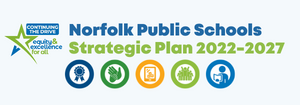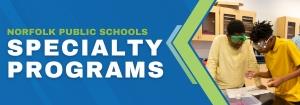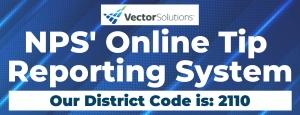Virtual Scholars Academy (VSA) is the virtual program for Norfolk Public Schools (NPS). We are serving independent, self-motivated, and highly engaged NPS students in grades kindergarten through twelfth grade. We utilize Virtual Virginia (VVA), a program of the Virginia Department of Education serving students in Virginia schools, to provide flexible options for the needs of our students and families. Although students are taking classes with VVA, they are still students of NPS and are assigned to their home school. VSA students have opportunities for traditional student interactions as they remain connected to their home school and can participate in all sports, clubs, and extracurricular activities.
Students enrolled in VSA have the capability to work independently. Time management is key since students will have to spend time working synchronously in their class, but also asynchronously as they complete assignments. The VSA staff along with VVA provides extensive student support through mentoring, technical assistance, learning resources and more.
Mission and Vision
The mission of the Norfolk Public Schools VSA Program, the cornerstone of a proudly diverse community, is to ensure that all students maximize their academic potential, develop skills for lifelong learning, and are successful contributors to a global society, as distinguished by:
-
Courageous advocacy for all students
-
Family and community investment
-
Data-driven personalized learning
-
Strong and effective leadership teams
-
Shared responsibility for teaching and learning
-
Access to rigorous and rewarding college and career readiness opportunities
The vision of our VSA program is that we are a world-class virtual school that expands access for all diverse student learners through a flexible, rigorous, relevant curriculum that incorporates skills and knowledge students need to succeed in a global technological society.
Is VSA Right for Your Student(s)
Before applying for VSA we encourage families to consider the following questions:
-
Are parents comfortable supervising some independent work for their student(s)? VVA only does 35 minutes of synchronous time for grades 6-12 in their course, so the remaining time the student has to work independently. This means parents need to be there to provide extra support when needed to guide their student(s) in the correct direction. Working virtually often takes more time in the class than going face to face, so parents and students need to be aware of the time commitment.
-
Does the student(s) have a dedicated space in the house free of distraction where they can complete work and be in class? Parents should set aside a dedicated study area, such as a cleared kitchen or dining room table. Sitting on the couch or bed may cause distractions like TV and other remote devices. Students learn best in a quiet environment with no distractions.
-
Can parents ensure that their student(s) complete(s) and upload their work in a timely manner? Parents need to ensure that their student(s) will upload evidence of completion of various activities when they are due so that the teacher can best determine the next instructional steps for students.
-
If your student(s) has an IEP, is the virtual setting the most appropriate setting? While in the virtual setting, we have to be sure the accommodations can be appropriately met. Parents often need to spend more time helping their students(s) since we do not have resource classes to provide extra support.
-
If your student(s) are not being successful in VSA, are parents prepared for their student(s) to return to their home school? If students are struggling in the program they will be withdrawn and parents will have to enroll them into their home school. VVA and VSA both have requirements that must be followed. If a student is not meeting those requirements, the student will be withdrawn.
-
Are parents willing to support their student(s) with management skills? Keeping track of classes and assignments may not be an easy task for many online students. Often they have difficulties managing time effectively without the support of their parent(s).











